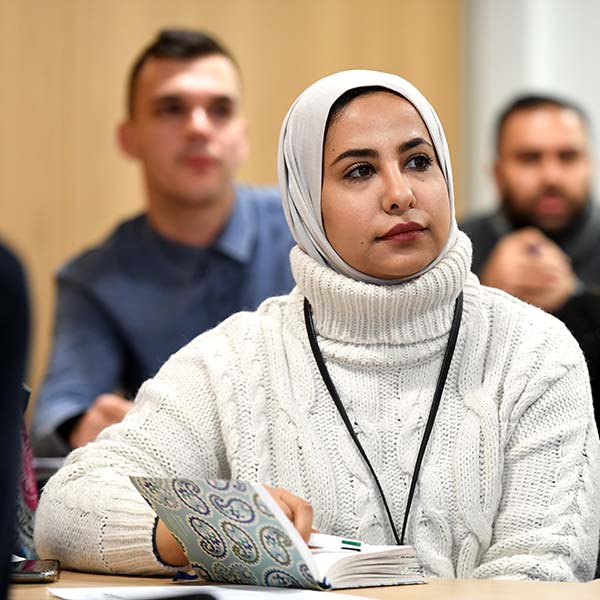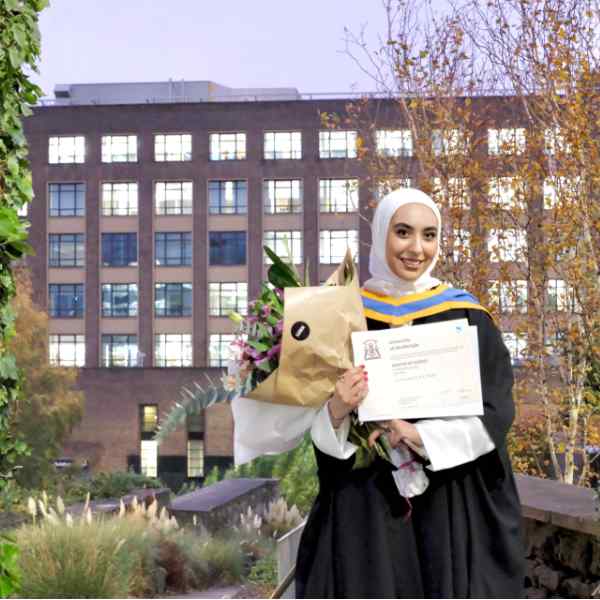MSc Clinical Pharmacy
ApplyKey facts
- Start date: September
- Study mode and duration: 12 months full-time
Number of places on course: 25
Study with us
- teaching is classroom based and is delivered by experienced pharmacists, the majority of whom are General Pharmaceutical Council (GPhC) registered
- benefit from advanced training to become a safe and effective practitioner by delivering optimal pharmaceutical care
- learn and develop skills in ‘service development’ and patient centred ‘Quality Improvement’
The Place of Useful Learning
UK University of the Year
Daily Mail University of the Year Awards 2026
Scottish University of the Year
The Sunday Times' Good University Guide 2026
Why this course?
This course is ideal for non-UK qualified pharmacists wanting to develop clinical skills to deliver ‘pharmaceutical care’. The course also provides foundations in health service research and will benefit Pharmacists working in hospital or community practice. You will receive advanced training in the practice of pharmacy, to enable you to deliver optimum pharmaceutical care, and become a safer and more effective practitioner. You'll be taught predominately by pharmacists registered with the General Pharmaceutical Council (GPhC).
Please note the MSc Clinical Pharmacy is not an advanced masters programme and does not result in a qualification allowing graduates to register in the UK as a Pharmacist. The course is primarily aimed at overseas pharmacists with limited existing clinical pharmacy experience. Content covered on the course is comparable to that delivered in the MPharm Pharmacy degree.
What you’ll study
The course content includes:
- learning in key clinical therapeutic areas including respiratory, cardiac, oncology, inflammatory disease, antimicrobials and mental health
- application of laboratory tests and their relevance in identification and monitoring of disease and drug therapy
- principles and practice of therapeutic drug monitoring
- oral communication and problem-solving communication in clinical settings
- concepts in Quality Improvement (QI) and service re-design
- reflective practice
- application of research methods in health service research
- a research project


Chat to a student ambassador
Want to know more about what it’s like to be a Science student at the University of Strathclyde? A selection of our current students are here to help!
Our Unibuddy ambassadors can answer all your questions about courses and studying at Strathclyde and offer insight into their experiences of life in Glasgow and Scotland.

Strathclyde’s supportive faculty and resources have been invaluable in shaping my skills and confirming my career aspirations.
MSc Clinical Pharmacy student
Course content
Semester 1
Students are enrolled in classes which introduce the key concepts and skills which are routinely applied in a clinical setting, including pharmaceutical care planning and consultation skills. Students will learn how to undertake critical analysis of empirical research which underpins the development of clinical guidelines.
Semester 2
Classes focus on specific clinical therapeutics with a focus on polypharmacy, as well as Leadership and Team Management, reflective practice and the principles of Health Economics.
Research Project
Students undertake an individual research project investigating a specific clinical topic. Project output will be written in the format of a clinical research paper.
Clinical Pharmacy & Pharmaceutical Care (20 credits)
Introduces principles of pharmaceutical care through interpretation of laboratory/clinical information in patients with common clinical conditions, focus on cardiovascular conditions.
Pharmaceutical Care & Therapeutic Drug Monitoring (20 credits)
Application of pharmacokinetic principles in clinical scenarios and communication (counselling) skills. Focus on mental health and inflammatory conditions.
Health Services Skills (20 credits)
Introduction to research methodologies and application of research governance and ethical practice.
Clinical Pharmacy Specialities & Practice (20 credits)
Develop skills in pharmaceutical care and understand the role of the pharmacist in health promotion, health economics and public health.
Long Term Conditions & Multimorbidity (20 credits)
Application of Pharmaceutical Care and Decision Making in complex patients.
Leadership & Quality Improvement (20 credits)
Introduction to theories/models of leadership & quality (service) improvement.
Learning & teaching
The course is delivered as workshops and tutorials as small group teaching, with some sessions delivered by senior pharmacists working in NHS Scotland.
Bedside teaching on NHS premises is not available on this course, including opportunities for placements/shadowing of NHS staff.
Assessment
Each element is assessed by a series of assignments based on your clinical evaluations. This includes written reports in the form of medicines information queries, developing pharmaceutical care plans and more traditional exam type assessments that are completed in short answer format based upon clinical scenarios.
Course awards
The Professor Steve Hudson Prize is awarded annually to the best performing student on the course. Professor Hudson was a pioneer in the development of ‘clinical pharmacy’ and held the Chair of Pharmaceutical Care from 1992 until his death in 2011. He passed away suddenly at the age of 58 and this award is in remembrance of his dedication to the profession and to the teaching of Clinical Pharmacy at the university.
Facilities
The Strathclyde Institute of Pharmacy & Biomedical Sciences (SIPBS) offers an excellent environment for research and teaching. It’s located in a new building with several laboratories. All labs are fitted with modern equipment.
International students
We've a thriving international community with students coming here to study from over 140 countries across the world. Find out all you need to know about studying in Glasgow at Strathclyde and hear from students about their experiences.

Entry requirements
| Academic requirements/experience | Minimum second-class (2:2) Honours degree or international equivalent in Pharmacy; plus a minimum of 18 months post-study clinical experience in a patient facing role or environment. A copy of your CV should be provided as proof, detailing work experience and duties. Applicants who hold an MPharm degree from the UK or Australia or a DPharm from the USA or Canada in the previous 5 years do not require the post-study clinical experience. |
|---|---|
| English language requirements | You must have an English language minimum score of IELTS 6.5 (with no component below 5.5). We offer comprehensive English language courses for students whose IELTS scores are below 6.0. Please see English Language Teaching for full details. As a university, we now accept many more English language tests in addition to IELTS for overseas applicants, for example, TOEFL and PTE Cambridge. View the full list of accepted English language tests here. |
Please note that, prior to starting the course, a Letter of Good Conduct is required from the police/authorities in a student's home country.
Fees & funding
All fees quoted are for full-time courses and per academic year unless stated otherwise.
Fees may be subject to updates to maintain accuracy. Tuition fees will be notified in your offer letter.
All fees are in £ sterling, unless otherwise stated, and may be subject to revision.
Annual revision of fees
Students on programmes of study of more than one year (or studying standalone modules) should be aware that the majority of fees will increase annually.
The University will take a range of factors into account, including, but not limited to, UK inflation, changes in delivery costs and changes in Scottish and/or UK Government funding. Changes in fees will be published on the University website in October each year for the following year of study and any annual increase will be capped at a maximum of 10% per year. This cap will apply to fees from 2026/27 onwards, which will not increase by more than 10% from the previous year for continuing students.
| Scotland | £16,750 |
|---|---|
| England, Wales & Northern Ireland | £16,750 |
| Republic of Ireland |
If you are an Irish citizen and have been ordinary resident in the Republic of Ireland for the three years prior to the relevant date, and will be coming to Scotland for Educational purposes only, you will meet the criteria of England, Wales & Northern Ireland fee status. For more information and advice on tuition fee status, you can visit the UKCISA - International student advice and guidance - Scotland: fee status webpage. Find out more about the University of Strathclyde's fee assessments process. |
| International | £33,600 |
| Available scholarships | Take a look at our scholarships search for funding opportunities. |
| Additional costs | Course materials All recommended textbooks are available in the library (and some freely available as online resources). However you may wish to purchase your own copies. Other costs There are returnable deposits for entry keycards and lockers (depending on your project location within Strathclyde Institute of Pharmacy & Biomedical Sciences). International students If you are an international student, you may have associated visa and immigration costs. Please see student visa guidance for more information. |
Please note: the fees shown are annual and may be subject to an increase each year. Find out more about fees.
Glasgow is Scotland's biggest & most cosmopolitan city
Our campus is based right in the very heart of Glasgow. We're in the city centre, next to the Merchant City, both of which are great locations for sightseeing, shopping and socialising alongside your studies.
Careers
After graduating, you’ll be qualified to progress within the pharmacy profession. This course provides the background training for graduates to develop and extend clinical pharmacy services in their own place of work.
The modern pharmacist is no longer restricted to the supply of medicines, instead, a more holistic approach is required to the safe and effective use of medicines. This course will make you a pharmacy professional whose practice is informed, evidence based and patient centred.
Dr Gazala Akram, Course Director
Apply
International fee-paying applicants
Twenty-five places are available for international fee-paying applicants on the MSc Clinical Pharmacy each year.
There is high demand for these places and once they have been filled, qualified applicants will be placed on a waiting list to be considered for an offer of admission if any places become available. We recommend applying early in the application cycle.
Please ensure you submit all supporting documentation before submitting your application to avoid a delay in processing your application.
Applicants who receive an offer of admission
To reserve a place on the MSc Clinical Pharmacy, applicants who have been made an offer of admission will be required to:
- accept their offer within 21 days.
- pay a deposit or provide evidence of a valid scholarship/ sponsorship, within 21 days of accepting their offer. Confirmation of the value of the deposit will be confirmed in the applicant’s offer letter.
Start date: Sep 2026
Clinical Pharmacy

